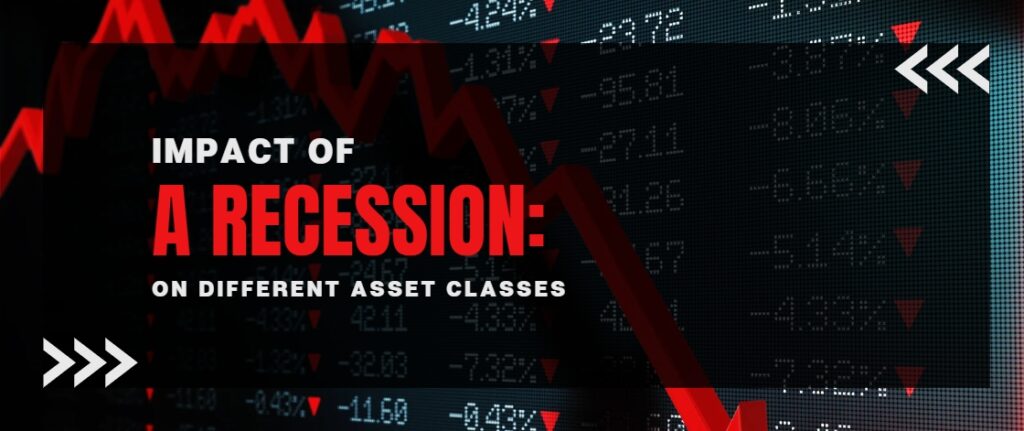
What is A Recession?
A recession refers to a significant decline in economic activity that lasts for an extended period. Many believe it is two consecutive quarters of negative GDP growth, but that isn’t the only defining factor anymore.
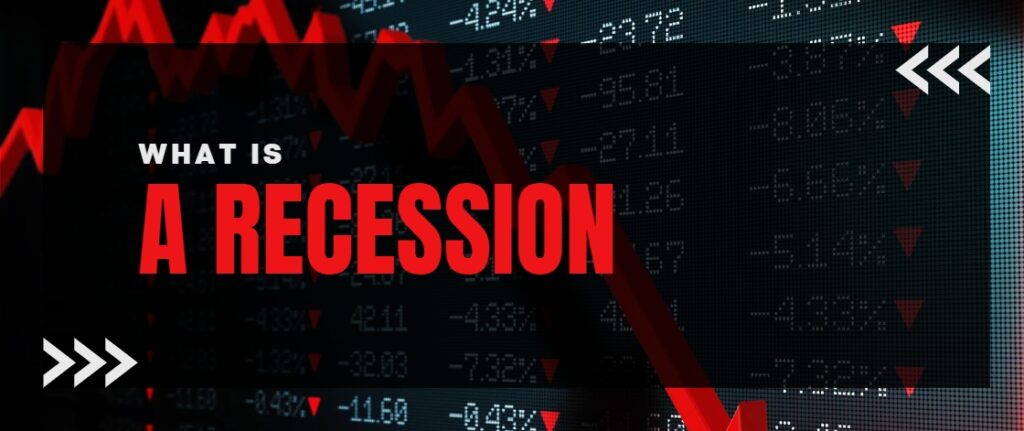
During a recession, the gross domestic product (GDP) falls, businesses struggle, and unemployment rates rise. A recession often leads to a market falling, and investors may experience losses as the value of their investments declines.
Various factors, such as a sudden drop in consumer spending, a decline in business investments, or an economic shock, such as a natural disaster or global crisis, can cause recessions.
Governments and central banks often respond to a recession by implementing economic policies to stimulate growth, such as reducing interest rates, increasing government spending, and providing financial support to struggling businesses.
Let’s look at some long-held notions about recessions to get more clarity on what a recession is and what isn’t.
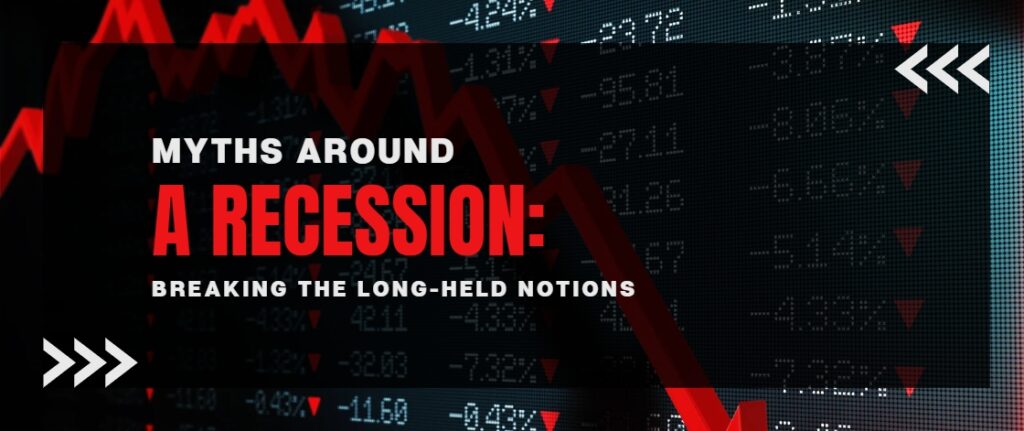
Myths Around A Recession: Breaking The Long-Held Notions
There are several long-held notions and myths about recessions that people believe to be true, but, in reality, they are not accurate recession indicators.
One common myth is that a recession is two consecutive quarters of negative GDP growth. However, while a decline in GDP is a significant recession indicator, it is not the only factor that defines a recession.
Another myth is that stock market volatility is a reliable indicator of an impending recession. While the stock market can be a valuable tool for measuring economic sentiment, it is not always a reliable predictor of a recession.
Similarly, rising unemployment rates, falling housing prices, and high consumer debt levels often count as recession indicators, but they are not necessarily definitive signs of an impending economic downturn.
Now that you know what counts as a recession & what doesn’t, let us have a detailed look at the signs of a recession.
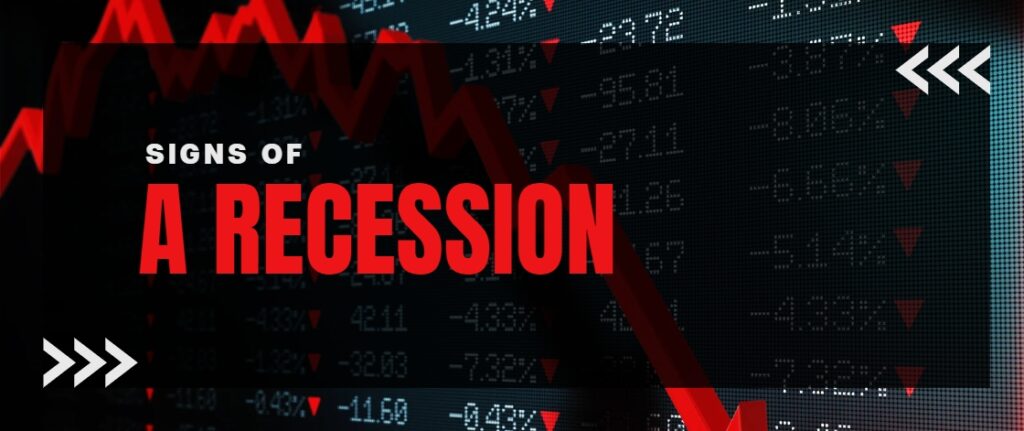
Signs of a Recession
A recession can have severe implications for businesses, individuals, and the economy at large. While predicting a recession is not an exact science, several indicators can suggest an imminent economic downturn. Here are some signs:
- Inverted Yield Curve- An inverted yield curve is one of the most reliable recession indicators. This occurs when short-term bond yields are higher than long-term bond yields, suggesting that investors are concerned about the economy’s long-term prospects. Historically, an inverted yield curve has often preceded a recession.
- Rising Unemployment- As businesses struggle during a recession, they often reduce their workforce, leading to increasing unemployment rates. This can clearly signal that the economy is slowing down, and a recession may be imminent.
- Declining Consumer Spending- Consumer spending is a critical driver of economic growth, and a decline in consumer spending can signify an impending recession. This could be due to various factors, such as rising debt levels or a lack of confidence in the economy.
- Slowing GDP Growth- A decline in GDP growth can also be a recession indicator. When economic growth slows, it can be a sign that businesses are struggling and that the overall economy is weakening.
- Falling Stock Market- Another recession indicator is a falling stock market. While stock market crashes do not always lead to a recession, they can be an indication that investors are losing confidence in the economy.
Not all of these recession indicators necessarily mean that a recession is imminent, and sometimes the economy can recover quickly. However, if several of these signs are present simultaneously, it is a good idea to be prepared for a potential economic downturn.
Next, let us discuss the impact of a recession on different asset classes.
If you need some ideas about what to read next, here they are:
- The Impact of Geopolitical Tensions on the Global Economy and the Risk of a Recession
- Should We Prepare For A Recession?
- Family Trust Explained: Everything You Need To Know About Family Trust Funds
- Fiduciary vs Non-Fiduciary Accounts: Differences & How They Impact The Investors’ Financial Decisions
Impact of a Recession on Different Asset Classes
A recession can significantly impact different asset classes, and investors must understand the potential risks and opportunities associated with each asset class. Here is how a recession may affect different asset classes:
- Equities- A falling stock market is common during a recession, which can lead to significant losses for equity investors. Companies may also face financial challenges, leading to declining stock prices.
- Bonds- Bonds are often considered safe-haven assets during a recession, but even they are not immune to the impact of a debt crisis. Bond prices may decline if companies struggle to repay their debt during a recession.
- Real Estate- Real estate is a cyclical asset that a recession can highly impact. A decline in consumer spending can lead to declining home prices, while reduced commercial demand can lead to a decline in commercial real estate prices.
- Commodities- Commodity prices can also be susceptible to a recession. Falling demand for goods and services can lead to declining commodity prices, which can significantly impact commodity investors.
Thus, these are the varied impacts on different asset classes, with equities being highly impacted by a falling stock market, and bonds, real estate, and commodities being sensitive to other recession indicators, such as a debt crisis and declining demand.
Now, why does recession matter to investors? Let us look at that next.
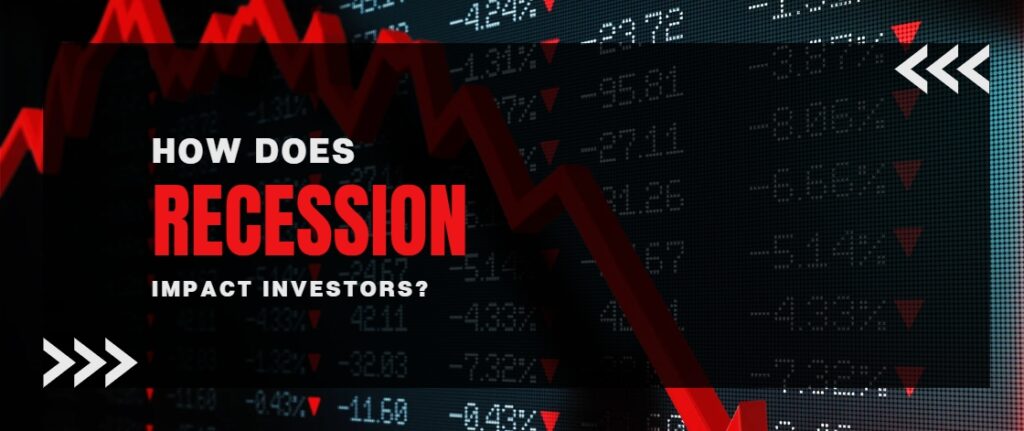
How Does Recession Impact Investors?
Recession matters to investors because it can significantly impact their investments. A stock market recession can cause stock prices to fall, leading to potential losses for investors. Moreover, a recession can lead to companies struggling to make profits or even staying afloat, leading to a further decline in their stock prices.
However, it’s not all bad news for investors during a recession. Historically, the stock market has often recovered after a recession, and investors who remain patient and continue investing in high-quality companies may benefit from the eventual market rebound. Therefore, understanding the potential risks and opportunities associated with a recession is crucial for investors to make strategic decisions about their investments.
In the next section, let us look at how investors can prepare themselves & their portfolios for a recession.
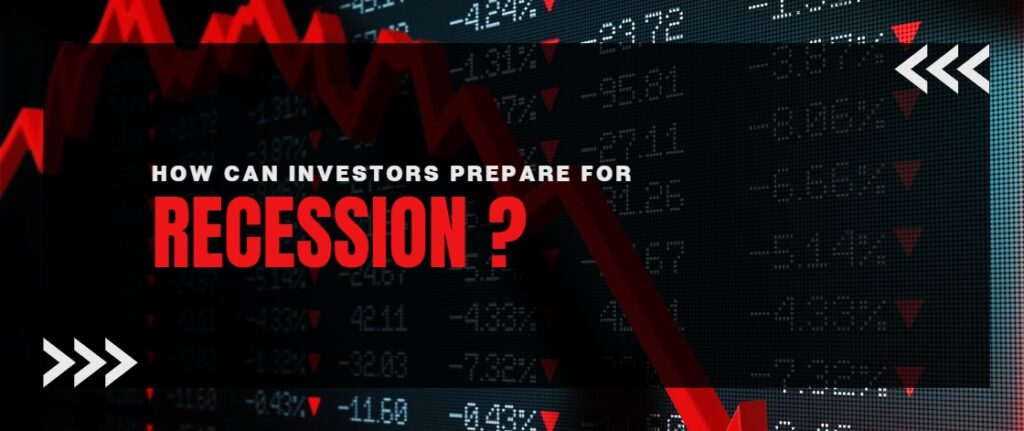
How Can Investors Prepare For Recession?
Investors can take specific steps to prepare themselves and their portfolios for a recession and beyond. Here are some tips:
- Diversify your portfolio- Diversifying your portfolio by investing in a mix of stocks, bonds, and alternative assets can help reduce your overall risk. Consider investing in defensive sectors, such as utilities, consumer staples, and healthcare, as these generally count as recession-proof industries.
- Focus on high-quality companies- During a recession, high-quality companies with solid financials, stable earnings, and competitive advantage are better positioned to weather the storm. Look for companies with a history of steady dividend payments, as these can provide a reliable source of income during tough economic times.
- Prepare for market volatility- Volatility can increase significantly during a stock market recession. It’s essential to prepare for this by having a long-term investment strategy and avoiding knee-jerk reactions to short-term market fluctuations.
- Keep a cash reserve- Maintaining a cash reserve can provide a buffer during a recession, as it can help you avoid selling your investments at a loss. Aim to have at least six months’ worth of living expenses saved in a low-risk, highly liquid account.
- Consider alternative investments- Alternative investments, such as real estate, commodities, private equity, and hedge funds like Secvolt, can provide diversification and potential returns uncorrelated with the stock market.
- Look for opportunities- While a recession can be challenging for investors, it can also present unique opportunities to buy high-quality stocks at discounted prices. Keep an eye out for companies with strong fundamentals that may have been oversold during a market downturn.
By following these steps, investors can weather the storm of a stock market recession and position themselves for long-term standing in the market.
In the final section, let us look at an alternative that has been breaking all the records lately and is an extraordinary solution for anyone looking to combat recession.
The Bottom Line
Investors should be aware of the signs of an imminent recession to prepare themselves and their portfolios better. Indicators such as an inverted yield curve, rising unemployment, declining consumer spending, and slowing GDP growth can all point towards an economic downturn. While a recession can be challenging for investors, taking steps such as diversifying your portfolio, focusing on high-quality companies, and keeping a cash reserve can help minimize the impact.
One such investment alternative that can help your portfolio combat recession is the record-breaking hedge fund Secvolt. With its effective quant models & efficient risk mitigation protocols, Secvolt has a proven track record of success even during difficult economic times. It generated an extraordinary 262.10% return in a turbulent year like 2022. While no one can predict the exact impact of a recession, investors can potentially minimize the same by keeping an eye on recession indicators and taking steps to prepare their portfolios. With the help of a trusted investment partner such as Secvolt, investors can position themselves for long-term success in any kind of economic environment.
Frequently Asked Questions(FAQs)
1) How do recessions affect investors?
Investors may experience significant losses due to a falling stock market and lower asset values. Recession often results in high levels of unemployment, which can lead to reduced consumer spending and decreased corporate profits. A recession can cause a decrease in investment returns, particularly in high-risk asset classes. As businesses struggle, increased credit risk may lead to a potential debt crisis.
2) Should you avoid investing during recessions?
No, you should not necessarily avoid investing during recessions. While market volatility can be unsettling, downturns can present unique investment opportunities, particularly in recession-proof industries such as healthcare, utilities, and consumer staples. However, it’s essential to research, diversify your portfolio, and seek guidance from trusted investment professionals before making any investment decisions.
3) What signs to look for in a recession?
There are several recession indicators to look out for, including an inverted yield curve, rising unemployment, declining consumer spending, and slowing GDP growth. Investors should also monitor financial and economic news to stay updated about potential market downturns. By recognizing these signs, investors can take proactive steps to protect their portfolios and minimize the impact of a recession.
4) What should investors do during a recession?
During a recession, investors should protect their portfolios by diversifying investments and focusing on high-quality companies with strong financials. While predicting whether the stock market will crash is difficult, investors can prepare by keeping a cash reserve and avoiding making emotional investment decisions. Additionally, investors can look for opportunities in undervalued assets or sectors poised for growth.
Join Our Newsletter
Elevate your financial game & join the ranks of elite investors with Secvolt’s exclusive newsletter.
Join Our Newsletter
Elevate your financial game & join the ranks of elite investors with Secvolt’s exclusive newsletter.
Don’t just dream of wealth; achieve it with Secvolt. Schedule a call today for personalized guidance on your investment strategy and join the ultra-successful.
Ready to unlock your wealth’s truest potential & cherish affluence?
Secvolt, our hedge fund, sets the bar high with a record-breaking performance of 262% returns in 2022. With the brilliance of our highly advanced quant models and the efficiency of our risk mitigation protocols, we are yet to see a loss!
We’re the perfect ally to help you succeed financially and build the lasting legacy you have always aspired for.
Get in touch today. YOUR LEGACY AWAITS YOU…

